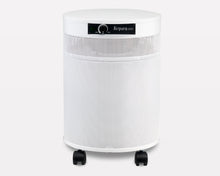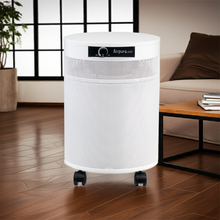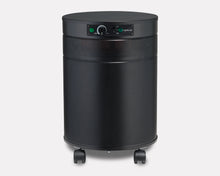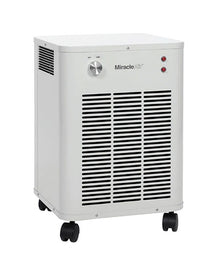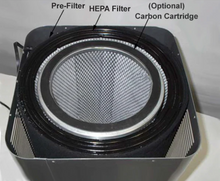Keeping Your Air Pure: Practical Tips for Maintaining an MCS-Friendly Home with Your Air Purifier
For individuals with Multiple Chemical Sensitivity (MCS), a high-quality air purifier isn't just a convenience—it’s an essential tool for creating a safe and healthy living environment. You've made the investment in a system designed to filter out the chemical triggers that can cause debilitating reactions, from volatile organic compounds (VOCs) to fragrances and airborne particles...

For individuals with Multiple Chemical Sensitivity (MCS), a high-quality air purifier isn't just a convenience—it’s an essential tool for creating a safe and healthy living environment. You've made the investment in a system designed to filter out the chemical triggers that can cause debilitating reactions, from volatile organic compounds (VOCs) to fragrances and airborne particles. But the work doesn't stop there. Maintaining that system, and the home environment it's meant to protect, is crucial for ensuring its continued effectiveness. Neglecting routine care, using the wrong cleaning products, or even a simple oversight in filter replacement can turn your air purifier from a source of relief into a potential problem. This guide will walk you through the essential, MCS-friendly practices for caring for your air purifier and your home, ensuring your complete home air purification system remains a consistent source of clean, pure air.
The challenge of living with MCS is that seemingly harmless, everyday products can trigger severe physical reactions. This is often due to the off-gassing of VOCs and other chemical pollutants from a wide range of sources, including conventional cleaning supplies, scented products, building materials, and even new electronics. An air purifier, particularly one with a robust activated carbon filter, works by adsorbing these chemical gases, effectively removing them from the air. However, this process means the filters themselves are doing the heavy lifting, accumulating pollutants over time.
This presents a unique challenge for those with MCS. The very device designed to clean the air can become a problem if not maintained correctly. Old, saturated filters can lose their effectiveness, allowing pollutants to pass through or, in some cases, re-release some of the chemicals they've captured. Furthermore, cleaning the unit itself with conventional, chemical-laden products can introduce a new source of VOCs, immediately contaminating the clean environment you've worked so hard to create. Maintaining an MCS-friendly home with an air purifier requires a conscious, holistic approach that goes beyond simply plugging in the unit. It demands a commitment to a low-VOC lifestyle, with careful consideration given to every cleaning product and maintenance step.
The Foundation of Care: Proper Filter Replacement
The single most critical aspect of maintaining your air purifier's effectiveness is timely and appropriate filter replacement. The filters are the heart of the system, and as they become saturated with pollutants, their ability to clean the air diminishes. For individuals with MCS, this is particularly important because an exhausted filter not only stops working but can potentially become a source of re-contamination.
-
Activated Carbon Filter Saturation: Activated carbon works like a sponge, with a massive surface area to trap chemical gases and odors. Over time, all the available binding sites on the carbon become filled, and the filter can no longer adsorb new pollutants. In some cases, a highly saturated filter may even begin to "off-gas" or re-release some of the chemicals it has absorbed, particularly when there are changes in temperature or airflow. This is a significant concern for those with MCS, for whom even minor re-exposure can be a major issue. This is why it is so important to adhere to a strict filter replacement schedule.
-
HEPA Filter Lifespan: While HEPA filters primarily trap particles rather than chemicals, they are a vital component of a comprehensive air filtration system. They capture allergens, dust, mold spores, and other particulates that can be irritants for those with MCS. A clogged HEPA filter restricts airflow, forcing the fan motor to work harder and reducing the overall efficiency of the unit. The U.S. Environmental Protection Agency (EPA) notes that all filters require regular replacement to maintain their effectiveness (U.S. EPA, 2023).
-
Replacement Schedule for MCS: For standard users, filter replacement schedules are often based on a general guideline, such as "every 6 to 12 months." However, for an MCS home, we at Commercial Air Purifiers, LLC, often recommend more frequent checks and, if necessary, earlier replacements. The high concentration of airborne irritants in a newly-decontaminated space, or in a home where there are still some sources of off-gassing, can cause filters to saturate faster than normal. Listen to your body and your purifier. If you notice symptoms returning or the unit's performance seems to be declining, it's a strong indicator that it may be time for a filter change, even if the manufacturer's suggested timeline hasn't been met.
Maintaining the Unit Itself: Low-VOC Air Purifier Care
Cleaning the exterior and interior of your air purifier is just as important as changing the filters, but it must be done with extreme caution. Using conventional cleaning products can be counterproductive and even dangerous for an MCS-sensitive individual.
-
Avoid Chemical Cleaners: Many household cleaners contain VOCs and fragrances that can trigger an MCS reaction. Products like sprays, wipes, and polishes can leave behind a chemical residue that continues to off-gas long after cleaning. Never use these to clean any part of your air purifier.
-
Recommended Cleaning Method: The most effective and safest way to clean your air purifier is to use a soft, lint-free cloth, slightly dampened with only filtered or distilled water. Gently wipe down the exterior surfaces, vents, and any exposed areas. For removing dust from pre-filters, use a clean, MCS-friendly vacuum cleaner with a soft brush attachment. Do not use water on HEPA or activated carbon filters, as this can damage their structure and render them ineffective.
-
First-Hand Experience: A number of our customers with MCS have shared valuable insights on this topic. One client, who had initially struggled with maintaining a clean unit without a reaction, shared her "low-VOC air purifier care" routine. She uses a pair of dedicated cotton gloves and a new, clean cloth with each cleaning session. She also meticulously vacuums the pre-filter in a different room or even outdoors to prevent any dust or particulate from being re-released in her clean living space. This level of meticulousness may seem extreme, but it highlights the dedication required to manage MCS effectively.
Creating a Broader MCS-Friendly Home Environment
While your air purifier is a powerful tool, it’s part of a larger ecosystem. For the best results, it's crucial to reduce sources of indoor air pollution wherever possible. This lessens the burden on your filters and contributes to a healthier environment overall.
-
Switch to Low-VOC Cleaning Products: Many conventional cleaning products are a significant source of VOCs. Fortunately, there are many simple and effective low-VOC alternatives. Common household staples like white vinegar, baking soda, and a mild, fragrance-free soap can replace most conventional cleaners. For example, a mixture of vinegar and water works as a great all-purpose surface cleaner, and baking soda can be used as a non-abrasive scrub (Dyson, 2025). This is an important step for maintaining a truly MCS-friendly home.
-
Mindful Cleaning Practices: When cleaning, ensure adequate ventilation. If you have a whole-home system, run the fan on a higher setting to maximize air circulation and filtration. If you are using portable units, place them strategically to capture pollutants released during cleaning.
-
Material Awareness: Be mindful of the materials in your home. New furniture, carpeting, and paint can off-gas for months or even years. Choose products that are certified low-VOC. When bringing new items into the home, consider "airing them out" in a well-ventilated space, like a garage, before moving them indoors.
-
The Power of Source Control: The EPA emphasizes that source control is the most effective way to improve indoor air quality. By removing or reducing the source of pollutants—whether it’s a chemical cleaner, an air freshener, or an off-gassing piece of furniture—you are directly addressing the root of the problem, making your air purifier's job easier and more effective (U.S. EPA, 2025).
Credible Conclusion
Maintaining an MCS-friendly home environment is a continuous effort that goes hand-in-hand with the use of a high-quality air purification system. The success of your complete home air purification for MCS depends on a proactive approach to care, from filter replacement to choosing the right cleaning products. We at Commercial Air Purifiers, LLC, have seen time and again that a well-maintained system, supported by a low-VOC home environment, can lead to a significant improvement in the quality of life for individuals with Multiple Chemical Sensitivity. By embracing these practical tips, you are not just maintaining a machine; you are sustaining a haven of clean air, providing yourself with the consistent, healthy environment you deserve.
Source Requirements:
-
Ashford, N. A., & Miller, C. S. (1998). Chemical exposures: Low levels and high stakes. John Wiley & Sons. (This provides foundational understanding of MCS and chemical exposures).
-
U.S. Environmental Protection Agency. (2023, February 17). Guide to Air Cleaners in the Home. Retrieved from https://www.epa.gov/indoor-air-quality-iaq/guide-air-cleaners-home (Provides authoritative information on air cleaner technologies and the importance of maintenance).
-
Dyson. (2025, April 15). Eco-friendly cleaning: Tips for reducing indoor air pollution. Retrieved from https://www.dyson.com/discover/insights/air-quality/indoor/eco-friendly-cleaning-tips-for-reducing-indoor-air-pollution (Offers practical, low-VOC cleaning alternatives and highlights the link between cleaning products and indoor air pollution).
Author Bio:
This article is by Commercial Air Purifiers, LLC, a leading provider of high-quality air purification solutions for residential and commercial spaces. With years of experience in the air quality industry, our team is dedicated to helping individuals and families create healthier indoor environments. We are committed to providing evidence-based information and effective products to address a wide range of air quality concerns, including the unique challenges faced by those with Multiple Chemical Sensitivity.
Publication Date: October 26, 2023
FAQ Section
Q: Can I wash my air purifier filters instead of replacing them?
A: Most air purifier filters, especially HEPA and activated carbon filters, are not designed to be washed. Washing them can destroy the delicate fiber structure of the HEPA filter and wash away or damage the activated carbon, making them completely ineffective. Always follow the manufacturer’s instructions for filter replacement.
Q: Why is an air purifier's housing material important for MCS?
A: The material an air purifier is made of is crucial because some plastics and other materials can off-gas VOCs, especially when heated by the unit's motor. For individuals with MCS, this can be a major trigger. Opting for a unit with a metal or inert housing is often a safer choice to avoid this secondary source of chemical pollution.
Q: How do I know when my activated carbon filter is saturated?
A: A saturated activated carbon filter will often stop effectively removing odors and chemical smells from the air. If you notice a return of smells that were previously gone, or if your MCS symptoms return in the presence of known triggers, it's a strong sign that the filter needs to be replaced. While some filters have a visual indicator, your senses are often the most reliable guide for an MCS-sensitive individual.
Q: Should I run my air purifier constantly, or only when I'm home?
A: For individuals with MCS, we at Commercial Air Purifiers, LLC, recommend running your air purifier constantly. Airborne pollutants are always present, and a continuous air purification and filtration system ensures that the air quality remains consistently high, preventing the buildup of irritants that can lead to a reaction. The energy cost is typically minimal, and the health benefits are substantial.

